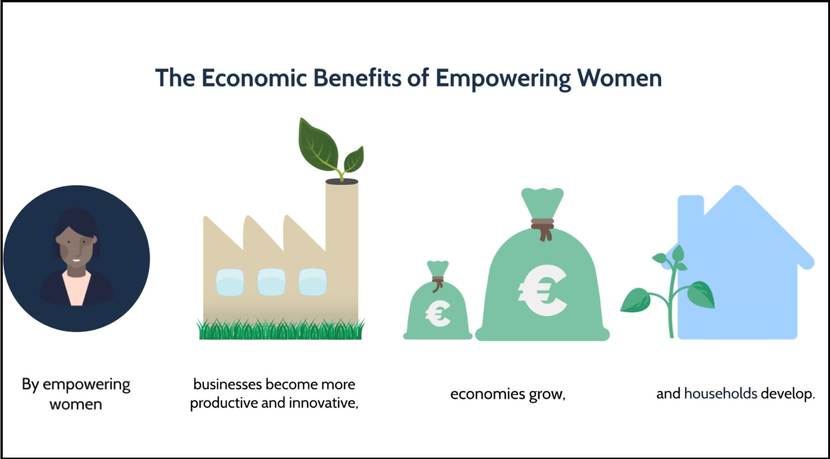Private sector development and equal rights for women: Time to scale up
Topics
Private sector development and equal rights for women can very well go hand in hand: ‘Where business is good for women, women are good for business’. It is part of the Dutch agenda for aid and trade to mobilize more private investment in equal benefits for women, as a business case. Likewise we encourage civil society, including local women’s organisations, to help design and implement impactful corporate strategies for women’s empowerment.
After working several years within the Dutch Ministry of Foreign Affairs to promote such synergy I would like to share three lessons with you:
The inclusion of women in private sector development is essential if we are to achieve the sustainable development goals.
There is a strong business case for private sector investments in women’s economic empowerment.
Shared value between companies and women can best be created in partnerships between companies and women’s rights organisations.
Inclusion of women in private sector development is essential to achieve sustainable development
Investments in gender equality are the most effective of all development investments.[1] Yet, while global gender gaps in health and education have virtually been closed, large gaps remain in economic participation and political empowerment.[2] In other words, many women are still excluded from economic and political spheres. Closing these gaps is not only a matter of justice: it is also a matter of development effectiveness. Engaging women as active participants contributes to more sustainable and more inclusive results. The international community and private sector are starting to realize that investing in women is smart economics and smart business.
Strong business case for supporting women’s economic empowerment
The economic and social benefits of fully including women in economic development are large, as shown in this prezi.
Examples of new and innovative partnerships that capitalize on these benefits begin to emerge in our work, especially in the financial sector, trade promotion and sustainable value chains.
In the financial sector the Dutch Good Growth Fund pays special attention to women-owned small and medium enterprises. This builds on international experience that if banks take a pro-active approach, women entrepreneurs form a profitable market segment. They pay back better on their loans, and they tend to stay more loyal to their bank.
In agricultural value chains we see good examples in coffee, tea and textiles. E.g. in coffee: Training in improved cultivation techniques becomes much more effective if a family approach is taken and women are trained along with the men. After all, women do most of the cultivation work. The family approach leads to higher yields and better quality of the coffee harvests. This means: higher income for the family, which moreover is spent more wisely, on family needs. The IDH Initiative for Sustainable Trade, Solidaridad and UTZ explore the potential for further integrating women in value chains.
In the textile sector the international drive to improve labour conditions has been intensified after the Rana Plaza disaster in Bangladesh. This drive is based on the premise that better labour conditions for the largely female work force will benefit both the garment industry and the workers. Fair Wear Foundation is piloting an approach to combat violence at the workplace, an issue that is very much linked to unequal social relations between men and women. Preliminary results support the thesis that the costs that factories make, for training supervisors and installing counselors, can be more than covered by the increase in productivity of the women workers, once they are no longer harassed.
Cooperation between the private sector and civil society organisations
In our experience such business cases for shared value creation between private sector and women require collaboration between the private sector and civil society, including local women’s organisations. The private sector has the drive, expertise and means to invest in improving its business performance. Civil society organisations that are locally embedded and engage the women involved can translate the women’s voices. They can help identify what constraints need to be overcome for the women to fulfill their economic potential. The crucial constraint may be harassment at the work floor, or a lack of childcare facilities, or any other constraints that are specific to every location. Having a local partner assist in designing appropriate solutions is invaluable for companies.
Private companies and foundations across the world are now investing billions of dollars in women and girls. We are convinced that their investments could have a far more lasting impact if they would cooperate with women’s organisations to address the constraints women face.[3][4] Many of the examples from our experience above take the form of multi-stakeholder initiatives where private and civil sector collaborate for shared benefits.
To conclude
Effective approaches are taking shape, for companies, civil society and donors like the Netherlands. But the pace is too slow. At the current rate it would take another eighty years to achieve gender equality at the work place. It is high time for other companies and civil society organisations to join the frontrunners and scale up investments!
Louise Anten
Twitter: @LouiseAnten
[1] OECD (2012) Gender equality in education, employment and entrepreneurship: Final Report to the MCM 2012
[2] http://reports.weforum.org/global-gender-gap-report-2014/report-highlights/
[3] http://www.oakfnd.org/economicempowerment
[4] http://www.ssireview.org/articles/entry/empowering_women_at_the_grassroots
